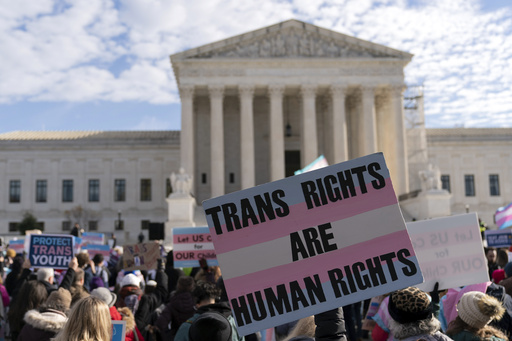The Supreme Court convened on Wednesday to deliberate on Tennessee’s legislative prohibition regarding gender-affirming healthcare for minors, a case that could significantly influence similar laws across 25 other states. Although the justices’ ruling is not anticipated for a few months, the outcome could set precedents affecting various regulations tied to the transgender community, including issues such as access to certain sports and restroom facilities.
This case stands before a court predominantly composed of conservative justices, following a presidential election cycle in which Donald Trump and his supporters indicated a desire to retract protections for transgender individuals. The context highlights the complex relationship between the law, political motives, and personal rights.
During the proceedings, the Biden administration’s lead Supreme Court lawyer cautioned that if Tennessee’s law is upheld, it may pave the way for nationwide constraints on transgender healthcare for youth. Over two hours of arguments revealed varying degrees of skepticism from five out of the six conservative justices toward the positions held by the administration and Chase Strangio, the ACLU attorney representing the families contesting the law.
Chief Justice John Roberts, reflecting on a past ruling that supported transgender rights, questioned whether such medical regulations should be left to the judiciary or appropriately handled by state lawmakers. He remarked, “The Constitution leaves that question to the people’s representatives, rather than to nine people, none of whom is a doctor,” while engaging Strangio in discussion.
The court’s three liberal justices appeared to strongly support the challengers’ argument, but it remained uncertain whether any of the conservative justices would align with them. Justice Sonia Sotomayor expressed concerns over the notion that democratic processes would resolve the law’s shortcomings, referencing historical instances of discrimination laws that neglected minority rights. She pointed out that transgender individuals are less than 1% of the total U.S. population, backing her claim with statistics from a UCLA law school study.
Justice Ketanji Brown Jackson drew parallels between Tennessee’s arguments and those from Virginia, which were dismissed by the unanimous court in the notable Loving case that legalized interracial marriage in 1967. Citing that case, she emphasized that Virginia at the time claimed, “the scientific evidence is substantially in doubt and, consequently, the court should defer to the wisdom of the state legislature.”
Notably, Justice Neil Gorsuch remained silent during the discussions, while Justice Samuel Alito engaged Strangio on whether transgender people should be classified legally as a group facing discrimination. Strangio confirmed that transgender individuals meet that definition but acknowledged some people do transition back, which Alito pointed out indicates it’s not an immutable trait. Strangio maintained his stance that these finer nuances do not require a determination from the court for the case’s outcome in favor of his clients.
Outside the court, rallies for both sides took place prior to the arguments, with supporters holding signs that resonated with their respective messages. Proponents of the ban had slogans like “Champion God’s Design,” while advocates for transgender rights promoted “Fight like a Mother for Trans Rights.”
In a landmark ruling four years ago, the court favored Aimee Stephens, a transgender woman dismissed from her job after revealing her identity; the court affirmed that such actions constitute sex discrimination under existing federal civil rights laws. The current case revolves around whether the Tennessee law infringes on the 14th Amendment’s equal protection clause by treating similarly situated individuals differently.
The Tennessee measure prohibits the use of puberty blockers and hormone treatments for transgender minors while permitting those same medications for unrelated medical reasons. Solicitor General Elizabeth Prelogar argued that Tennessee’s law creates an unlawful distinction based on sex to deny these treatments and overlooked the opinions of patients, parents, and medical providers.
Conversely, Matt Rice, the Solicitor General for Tennessee, asserted that lawmakers are protecting minors from what he characterized as “risky, unproven medical interventions.” He likened the treatments to historically discredited practices like lobotomies and eugenics, asserting that the state’s regulations do not discriminate by sex but differentiate based on treatment goals.
The discussion included references to past decisions. Tennessee’s position draws on the 2022 Dobbs ruling, which returned power over abortion regulations to the states, contrasting with the perspective pushed by opponents invoking the precedent from the Bostock v. Clayton County case that emphasized the crucial role sex plays in discrimination against transgender individuals.
At stake is how the court will gauge the law’s scrutiny level. Lower-tier scrutiny generally favors laws, whereas heightened scrutiny — which requires the state to prove an essential objective behind the law — could lead to the case being sent back to a lower court for further examination.
Major medical organizations, including the American Medical Association, have voiced their support for gender-affirming care for youth, citing its importance for the well-being of these young individuals. Justices Thomas, Alito, and Kavanaugh, however, referred to findings suggesting potential risks associated with these treatments from health authorities in several European countries, questioning the legitimacy of the treatments in context.
Kavanaugh raised concerns about the implications of a ruling against Tennessee potentially granting transgender athletes a constitutional right to participate in women’s sports. Prelogar countered that a narrowly defined ruling wouldn’t change existing regulations regarding sports participation.
